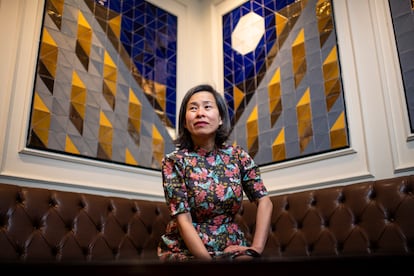Step into the world of Kim Thúy, a vibrant presence in a colorful flowered dress, whose smile lights up any room she walks into. Having made a mistake by indulging in churros at midnight, she shares how it disrupted her sleep. Born in Saigon 55 years ago, Kim Thúy was among the boat people – Vietnamese individuals who fled their country by sea after the Communist victory in the war. Surviving the perilous journey, she found refuge in a camp in Malaysia before Canada welcomed her with open arms, leading her to settle in Quebec. Known for her novelistic work that is a collection of short, poetic vignettes, Kim Thúy’s writing delves into the memories of war and the challenges of integration as a migrant in a foreign land.
Question: You often mention Vietnamese people as reserved, yet you exude expressiveness. Can you elaborate on that?
Answer: Kim Thúy explains, “I am Canadian, more specifically, from Quebec. Unlike English Canada, which leans towards being reserved due to Anglo-Saxon influence, Quebecers embrace expressiveness. However, my level of expressiveness may seem exaggerated as I strived to fully immerse myself in Quebec’s culture. My experiences as a boat person have shaped my identity and amplified my expressiveness, making me a caricature of sorts.”
Q: Could you share a bit about your journey as a boat person?
A: Recalling the fateful day they landed in Malaysia, Kim Thúy recounts, “We disembarked, and within 15 minutes, the boat succumbed to the sea, almost taking us down with it. Every day since then has been a bonus, a gift. The impending danger instilled in me a profound sense of gratitude and responsibility towards embracing happiness.”
Q: Why did you flee Vietnam?
A: Reflecting on the post-war persecution in Vietnam, Kim Thúy shares, “As inhabitants of the south, we faced grim prospects under the Communist regime. The looming threat forced us to embark on a perilous journey, knowing that survival was uncertain. Death seemed inevitable, whether at sea or in battle, a fate we reluctantly accepted.”
Q: What inspired you to write about the war and migration?
A: Kim Thúy explains, “Vietnam’s history primarily reflects the winning side’s narrative, neglecting the plight of boat people. As a witness, not a historian, I aim to preserve our untold stories. It’s essential to acknowledge diverse perspectives to foster understanding and reconciliation.”

INMA FLORES
Q: In light of ongoing conflicts worldwide, why do we continue to engage in war?
A: Kim Thúy reflects, “History’s cyclical nature perpetuates conflicts, revealing humanity’s darker tendencies. It’s vital to educate future generations on embracing empathy and restraining destructive impulses to foster peace.”
Q: How can we promote unity and understanding amidst growing nationalist sentiments?
A: Kim Thúy emphasizes, “By unraveling human stories, we bridge divides and dispel misconceptions. Every individual carries a unique narrative that transcends labels and stereotypes. Immigrants should be seen as investments in societal growth, nurturing diversity and resilience.”
Q: What role does politics play in shaping our perception of immigration?
A: Kim Thúy states, “Politics often inflames fears surrounding immigration for divisive purposes. Yet, in reality, personal connections and shared experiences break down barriers and foster mutual understanding. By humanizing immigration, we cultivate a more empathetic and inclusive society.”
Stay informed by subscribing to our weekly newsletter for the latest English news coverage from EL PAÍS USA Edition.

